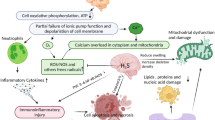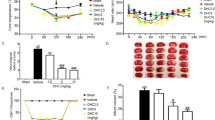Abstract
Hydrogen sulfide (H2S), a well-known toxic gas, is regarded as endogenous neuromodulator and plays multiple roles in the central nervous system under physiological and pathological states, especially in secondary neuronal injury. Recent studies have shown relatively high concentrations of hydrogen sulfide (H2S) in the brain and also cytoprotective effects of endogenous and exogenous H2S in models of in vitro and in vivo ischemic injury. H2S protects neurons by functioning as an anti-oxidant, anti-inflammatory, and anti-apoptotic mediator and by improving neurological function. Moreover, it protects neurons from glutamate toxicity. Therefore, the present study aimed to determine whether H2S provides protection in transient focal cerebral ischemia. Focal ischemia was induced by 60-min middle cerebral artery occlusion (MCAO), followed by 23-h reperfusion. Saline as a vehicle and NaHS (H2S donor; 1 and 5 mg) were intraperitoneally injected (IP) at the beginning of ischemia. Infarct volume, brain edema, and apoptosis were assessed 24 h after MCAO.
Treatment with NaHS at doses of 1 and 5 mg markedly reduced total infarct volumes by 29 and 51 %, respectively (P < 0.001). In addition, NaHS at doses of 1 and 5 mg reduced brain edema (P < 0.05) and inhibited apoptosis by decreasing positive TUNEL cells (P < 0.001).
The present study shows that treatment with H2S reduces brain injuries and postischemic cerebral edema in a dose-dependent manner likely through the blocking programmed cell death.
We propose that H2S might be a promising therapeutic target for stroke, although more researches are necessary to take into account the potential therapeutic effects of H2S in stroke patients.





Similar content being viewed by others
References
Abe K, Kimura H (1996) The possible role of hydrogen sulfide as an endogenous neuromodulator. The Journal of neuroscience 16:1066–1071
Aboutaleb, N., Kalalianmoghaddam, H., Eftekhari, S., Shahbazi, A., Abbaspour, H. & Khaksari, M (2013). Apelin-13 inhibits apoptosis of cortical neurons following brain ischemic reperfusion injury in a transient model of focal cerebral ischemia. International Journal of Peptide Research and Therapeutics, 1–6.
Barone FC, Arvin B, White RF, Miller A, Webb CL, Willette RN, Lysko PG, Feuerstein GZ (1997) Tumor necrosis factor-α: a mediator of focal ischemic brain injury. Stroke 28:1233–1244
Bian J-S, Yong QC, Pan T-T, Feng Z-N, Ali MY, Zhou S, Moore PK (2006) Role of hydrogen sulfide in the cardioprotection caused by ischemic preconditioning in the rat heart and cardiac myocytes. J Pharmacol Exp Ther 316:670–678
Buttini M, Appel K, Sauter A, Gebicke-Haerter PJ, Boddeke H (1996) Expression of tumor necrosis factor alpha after focal cerebral ischaemia in the rat. Neuroscience 71:1–16
Chan PH (2001) Reactive oxygen radicals in signaling and damage in the ischemic brain. J Cereb Blood Flow Metab 21:2–14
Edwards JL, Vincent AM, Cheng HT, Feldman EL (2008) Diabetic neuropathy: mechanisms to management. Pharmacol Ther 120:1–34
Florian B, Vintilescu R, Balseanu AT, Buga A-M, Grisk O, Walker LC, Kessler C, Popa-Wagner A (2008) Long-term hypothermia reduces infarct volume in aged rats after focal ischemia. Neurosci Lett 438:180–185
Hu LF, Wong PTH, Moore PK, Bian JS (2007) Hydrogen sulfide attenuates lipopolysaccharide‐induced inflammation by inhibition of p38 mitogen‐activated protein kinase in microglia. J Neurochem 100:1121–1128
Jha S, Calvert JW, Duranski MR, Ramachandran A, Lefer DJ (2008) Hydrogen sulfide attenuates hepatic ischemia-reperfusion injury: role of antioxidant and antiapoptotic signaling. American Journal of Physiology-Heart and Circulatory Physiology 295:H801–H806
Johansen D, Ytrehus K (2006) Exogenous hydrogen sulfide (H2S) protects against regional myocardial ischemia–reperfusion injury. Basic Res Cardiol 101:53–60
Khaksari M, Aboutaleb N, Nasirinezhad F, Vakili A, Madjd Z (2012) Apelin-13 protects the brain against ischemic reperfusion injury and cerebral edema in a transient model of focal cerebral ischemia. J Mol Neurosci 48:201–208
Kimura Y, Kimura H (2004) Hydrogen sulfide protects neurons from oxidative stress. The FASEB journal 18:1165–1167
Kuroda S, Siesjö B (1997) Reperfusion damage following focal ischemia: pathophysiology and therapeutic windows. Clinical Neuroscience (New York, NY), 4, 199
Leeper NJ, Tedesco MM, Kojima Y, Schultz GM, Kundu RK, Ashley EA, Tsao PS, Dalman RL, Quertermous T (2009) Apelin prevents aortic aneurysm formation by inhibiting macrophage inflammation. American Journal of Physiology-Heart and Circulatory Physiology 296:H1329
Liu T, Clark RK, Mcdonnell PC, Young PR, White RF, Barone FC, Feuerstein GZ (1994) Tumor necrosis factor-alpha expression in ischemic neurons. Stroke 25:1481–1488
Lu M, Hu L-F, Hu G, Bian J-S (2008) Hydrogen sulfide protects astrocytes against H2O2-induced neural injury via enhancing glutamate uptake. Free Radic Biol Med 45:1705–1713
Luo, Y, Yang X, Zhao S, Wei C, Yin Y, Liu T, Jiang S, Xie J, Wan X, Mao M (2013) Hydrogen Sulfide Prevents OGD/R-induced apoptosis via improving mitochondrial dysfunction and suppressing an ROS-mediated caspase-3 pathway in cortical neurons. Neurochemistry international
Minamishima S, Bougaki M, Sips PY, De Yu J, Minamishima YA, Elrod JW, Lefer DJ, Bloch KD, Ichinose F (2009) Hydrogen sulfide improves survival after cardiac arrest and cardiopulmonary resuscitation via a nitric oxide synthase 3-dependent mechanism in mice. Circulation 120:888–896
Nawashiro H, Martin D, Hallenbeck JM (1997a) Inhibition of tumor necrosis factor and amelioration of brain infarction in mice. J Cereb Blood Flow Metab 17:229–232
Nawashiro H, Tasaki K, Ruetzler CA, Hallenbeck JM (1997b) TNF-α pretreatment induces protective effects against focal cerebral ischemia in mice. J Cereb Blood Flow Metab 17:483–490
Oh SM, Betz AL (1991) Interaction between free radicals and excitatory amino acids in the formation of ischemic brain edema in rats. Stroke 22:915–921
Rolo AP, Palmeira CM (2006) Diabetes and mitochondrial function: role of hyperglycemia and oxidative stress. Toxicol Appl Pharmacol 212:167–178
Sivarajah A, Mcdonald M, Thiemermann C (2006) The production of hydrogen sulfide limits myocardial ischemia and reperfusion injury and contributes to the cardioprotective effects of preconditioning with endotoxin, but not ischemia in the rat. Shock 26:154–161
Slivka A, Murphy E, Horrocks L (1995) Cerebral edema after temporary and permanent middle cerebral artery occlusion in the rat. Stroke 26:1061–1066
Swanson RA, Morton MT, Tsao-Wu G, Savalos RA, Davidson C, Sharp FR (1990) A semiautomated method for measuring brain infarct volume. J Cereb Blood Flow Metab 10:290–293
Szabó C (2007) Hydrogen sulphide and its therapeutic potential. Nat Rev Drug Discov 6:917–935
Tan BH, Wong PT-H, Bian J-S (2010) Hydrogen sulfide: a novel signaling molecule in the central nervous system. Neurochem Int 56:3–10
Tyagi N, Moshal KS, Sen U, Vacek TP, Kumar M, Hughes Jr WM, Kundu S, Tyagi SC (2009) H2S protects against methionine-induced oxidative stress in brain endothelial cells. Antioxidants & redox signaling 11:25–33
Vakili A, Kataoka H, Plesnila N (2005) Role of arginine vasopressin V1 and V2 receptors for brain damage after transient focal cerebral ischemia. J Cereb Blood Flow Metab 25:1012–1019
Wang R (2002) Two’s company, three’s a crowd: can H2S be the third endogenous gaseous transmitter? The FASEB journal 16:1792–1798
White BC, Sullivan JM, Degracia DJ, O’neil BJ, Neumar RW, Grossman LI, Rafols JA, Krause GS (2000) Brain ischemia and reperfusion: molecular mechanisms of neuronal injury. J Neurol Sci 179:1–33
Yao L-L, Huang X-W, Wang Y-G, Cao Y-X, Zhang C-C, Zhu Y-C (2010) Hydrogen sulfide protects cardiomyocytes from hypoxia/reoxygenation-induced apoptosis by preventing GSK-3β-dependent opening of mPTP. American Journal of Physiology-Heart and Circulatory Physiology 298:H1310–H1319
Yin W-L, He J-Q, Hu B, Jiang Z-S, Tang X-Q (2009) Hydrogen sulfide inhibits MPP+-induced apoptosis in PC12 cells. Life Sci 85:269–275
Zhang L-M, Jiang C-X, Liu D-W (2009) Hydrogen sulfide attenuates neuronal injury induced by vascular dementia via inhibiting apoptosis in rats. Neurochem Res 34:1984–1992
Zoppo G, Ginis I, Hallenbeck JM, Iadecola C, Wang X, Feuerstein GZ (2000) Inflammation and stroke: putative role for cytokines, adhesion molecules and iNOS in brain response to ischemia. Brain Pathol 10:95–112
Acknowledgment
The author is willing to thank Mrs Farzane Amanpour for the kind support.
Author information
Authors and Affiliations
Corresponding author
Rights and permissions
About this article
Cite this article
Gheibi, S., Aboutaleb, N., Khaksari, M. et al. Hydrogen Sulfide Protects the Brain Against Ischemic Reperfusion Injury in a Transient Model of Focal Cerebral Ischemia. J Mol Neurosci 54, 264–270 (2014). https://doi.org/10.1007/s12031-014-0284-9
Received:
Accepted:
Published:
Issue Date:
DOI: https://doi.org/10.1007/s12031-014-0284-9




